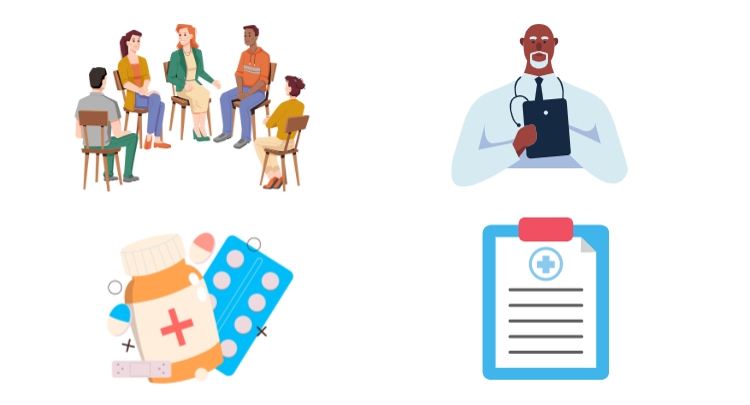
Substance addiction is a complex disease that requires a comprehensive and individualized approach to treatment. There are several different treatment options available, and the most effective treatment will depend on the individual's specific needs and circumstances. Here are some of the most common treatment options for substance addiction:
-
Medications: Medications can be an effective tool in the treatment of substance addiction, particularly for managing withdrawal symptoms and reducing cravings. For example, methadone and buprenorphine can be used to manage opioid addiction, while nicotine replacement therapies (such as patches or gum) can help individuals quit smoking. Medications can also be used to treat co-occurring mental health disorders, such as depression or anxiety.
-
Behavioral therapies: Behavioral therapies, such as cognitive-behavioral therapy (CBT) and dialectical behavior therapy (DBT), can help individuals identify and change negative thought patterns and behaviors related to substance use. CBT focuses on helping individuals recognize and modify negative thoughts and beliefs that contribute to substance use, while DBT emphasizes developing skills to manage intense emotions and improve relationships.
-
Support groups: Support groups, such as Alcoholics Anonymous (AA) and Narcotics Anonymous (NA), provide individuals with a supportive community of people who are also in recovery. These groups typically follow a 12-step program that emphasizes surrender to a higher power and personal accountability.
-
Residential treatment: Residential treatment programs provide individuals with a structured and supportive environment where they can focus on their recovery without the distractions and triggers of everyday life. These programs may include individual and group therapy, medication management, and education about addiction and recovery.
-
Outpatient treatment: Outpatient treatment programs allow individuals to receive treatment while continuing to live at home and attend work or school. These programs may include individual and group therapy, medication management, and education about addiction and recovery. Outpatient treatment may be appropriate for individuals with mild to moderate addiction who have a strong support system and stable living environment.
-
Holistic therapies: Holistic therapies, such as yoga, meditation, and acupuncture, can be used in conjunction with other treatments to address the physical, emotional, and spiritual aspects of addiction. These therapies may help individuals manage stress and anxiety, improve sleep, and increase feelings of well-being.
It is important to note that there is no one-size-fits-all approach to treating substance addiction, and the most effective treatment will depend on the individual's specific needs and circumstances. It is also important to work with a qualified healthcare professional who can provide an accurate diagnosis and develop a comprehensive treatment plan. With the right treatment and support, however, individuals can overcome substance addiction and live a healthy and fulfilling life.
All content found on the DrugHelpCenters.com Website, including: text, images, audio, or other formats were created for informational purposes only. If you think you may have a medical emergency, call your doctor, go to the emergency department, or call 911 immediately. DrugHelpCenters.com does not recommend or endorse any specific tests, physicians, products, procedures, opinions, or other information that may be mentioned on DrugHelpCenters.com.